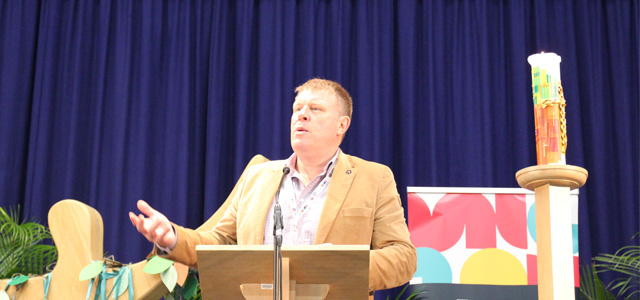A proposal to introduce changes to how the Uniting Church in NSW and the ACT handles the process of formation has been introduced at the Synod meeting. In general, it seeks to make the formation process more flexible to meet the needs of diverse churches.
If the proposal gains consensus, over the next three years, Synod will work with Presbyteries to reshape the process of formation.
The proposal consists of five sections, or work packages. It introduces a number of new dimensions to how Uniting Church ministry agents may be formed, including what courses might be included in the process.
The proposal also seeks to create an app to support the engagement of congregations. It also aims to introduce a central database of all those who have entered into a formal period of discernment process.
NSW Moderator Rev. Simon Hansford and Associate Secretary Rev. Bronwyn Murphy spoke to the proposal, which was chaired by past Moderator Rev. Niall Reid.
“Our community forms us and shapes us for ministry,” Rev. Hansford said.
The proposal acknowledges that the Synod currently has fewer ministry candidates than is needed, currently around 26.
Of those, half are Anglo, while 25 percent are Pacifica and Korean. One candidate is Malaysian-Shri Lankan and one South American.
Rev. Hansford said that it would be a mistake to think that the shortage was the result of a “mechanical problem” that could be changed.
Instead, he proposed, the church has a problem with its understanding of minister’s calling, which, he suggested, focused too much on an individual call, and not enough on the shape of diverse congregations.
“The deceit we have held for ourselves is that this is about call,” the Moderator said.
“It’s not about call. It’s about call and discipleship.”
“The task of congregations and each and every minister is to remind each other of this task.
“This is not a structural, mechanical solution. It is cultural.”
The church, the Moderator said, needs to ask itself “How do we create or encourage [communities of discipleship]?”
“How do we hear the call of God, not just for those particular ones but for everyone?”
Rev. Hansford said that the proposal aimed at “looking at new ways…that recognise a diverse church.”
“The earlier question is, how do we resource congregations?”
Rev. Hansford said that “New expressions and forms of ministry” had to play a role.
The proposal will be considered by discernment groups.
The 2019 Synod meeting is currently underway at Knox Grammar School until Sunday, 7 June.
Image by Jonathan Hirt
Jonathan Foye is Insights’ Editor






1 thought on “Transforming formation”
The “call of God” raises the issue of what is meant by a “God” who calls. Churches today appear to be dealing with an ambivalent and even a multivalent concept of God. [1] One is the more personalised concept, which has arisen and continues to exist within Christianity’s traditional supernatural, expedient, experiencial, subjective and faith-based context during the past 2,000 years. [2] Another concept relates to the more impersonal “Ground of Being” and has more recently arisen within our World’s scientific, naturalistic, evidence-based and objectively-empirical context. [3] A third context of course is that of Atheism.
Obviously, there is a deeper issue here, which involves conflicts between concepts and which may be an important factor in the decreasing size of nearly all of the 21st century Christian denomintions. In my opinion, this “cultural conflict” also needs to be seriously investigated.